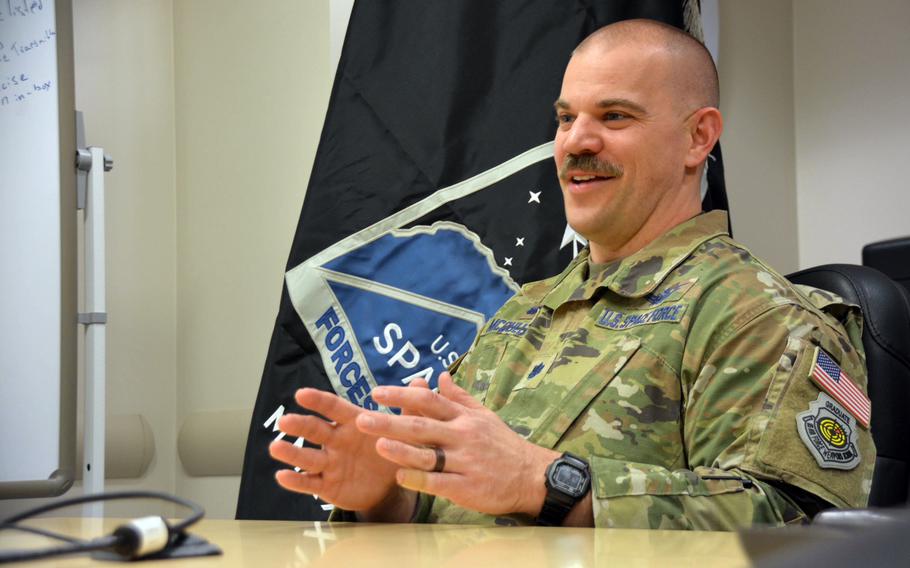
Lt. Col. Joshua McCullion, the commander of U.S. Space Forces Korea, speaks to Stars and Stripes at Camp Humphreys, March 3, 2023. (Christopher Green/Stars and Stripes)
CAMP HUMPHREYS, South Korea — U.S. Space Forces Korea, just three months old and the newest command in the Space Force, is finding a clear role amid new threats from North Korea, according to its commander.
Early missile detection is an integral part of the U.S. military’s defense of its 28,500 troops stationed on the peninsula, particularly with just 60 miles separating North Korea and Osan Air Base, where U.S. Space Forces Korea, or SPACEFOR-KOR, is headquartered.
Pyongyang continues to reject calls from Seoul and Washington, D.C., to get rid of its nuclear arsenal and end ballistic missile tests. The communist regime under leader Kim Jong Un has test-fired five missiles so far this year and about 75 in 2022, an annual record.
Missile detection is a “top concern” for the command but a “complex beast” to face, SPACEFOR-KOR commander Lt. Col. Joshua McCullion told Stars and Stripes on March 3 at U.S. Forces Korea's headquarters.
McCullion said satellites need time to be adequately positioned to provide as clear an image as possible as proof that North Korea was preparing for a missile launch.
“The more we know, the more we can posture the satellite systems to be ready for focused collection,” he said. “They’re always there, and they’re always watching, but if you focus, put the people in the systems, I can now cut down on the timeline even more. I can get you more fidelity on what’s happening. I can get a warning out quicker.”
Once North Korea fires a missile, Space Force guardians notify U.S. forces and share that information with their South Korean counterparts, who can compare the data with their missile-detection systems.
“If it’s leaving the peninsula, we’re going to call it,” McCullion said.
Lean but formidable
North Korea has demonstrated its ability to jam GPS and satellite communications and “likely intends to deny space-based navigation and communications during conflict,” Army Gen. James Dickinson, the head of U.S. Space Command, told the U.S. House Armed Services Committee on Wednesday.
“We have to have the capabilities to be able to see and characterize what’s going on in the space domain,” he said.
That effort includes standing up SPACEFOR-KOR, and McCullion said he’s gathered most of the data he needs to make the independent field command effective.
“We’re not going to have hundreds of people, especially in Korea,” McCullion said. “We just frankly don’t have the numbers in the Space Force as a whole.”
The Space Force footprint in South Korea will be small compared to other commands, but it may call on U.S. Space Command for guardians and satellites, and on allies like Japan and Australia.
“Space just doesn’t stop in Korea,” McCullion said. “A lot of our satellites can see a third of the globe at any given time.
“We’re still new,” he said, but “lots of cool things (are) coming” in the years to come, like next-generation missile warning capabilities.
Educating the force
One challenge McCullion said he faces is educating units about Space Force capabilities and how it can contribute to their missions.
SPACEFOR-KOR’s core duties — detecting missiles and providing and defending satellite communications and access to navigational tools like GPS — can be broadly explained but are difficult to grasp for units unfamiliar with their work, according to McCullion.
Explaining those capabilities will be a “heavy lift” for the next couple of years, he said, adding that the command has begun training with units in South Korea so they know about Space Force services.
“It’s hard to capture for people the level of detail: what altitude is an aircraft flying at, how fast is a ship moving, what frequencies do they have, how do you hand off from one satellite to another satellite as you transit across large bodies of water,” McCullion said. “It’s all very detailed work that takes an incredible amount of time to collect that data [and] where we didn’t have all those processes established in the past.”
Operations in space need time; it can take months to reposition a satellite to give commanders a clear sense of the battlefield, McCullion said.
“Some people just worry about, ‘Where am I going to stop for gas in the next 15 miles,’” he said. "We’re like, ‘How much gas are you going to need in three months?”